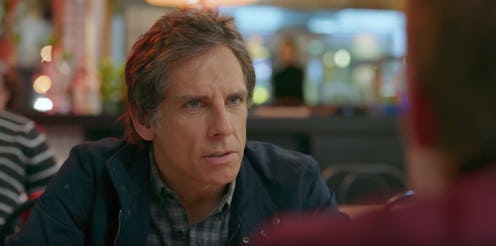Entertainment
Ben Stiller's New Movie Actually Shows A White Man Getting His Privileged Checked & It's About Damn Time
Ben Stiller's new film, Brad's Status, is not the kind of raucous comedy we're used to seeing him in. Instead, this quiet indie gets contemplative and dark when it comes to the titular Brad (Stiller), who assesses whether he has lived up to his full potential in life in his late 40s. Brad constantly obsesses and compares himself to his richer, more successful male peers, which can get grating, especially for those in the audience who aren't white men. So, it comes as a breath of fresh air that, late in the film, Brad's white privilege is checked by another character. It's a scene that's a fresh change of pace from most movies (and real life, sadly) because, for a few minutes, viewers get to watch a privileged white man get taken off his high horse and made to reckon with the fact he is allowed to move through the world with relative ease.
Everything is not as bad as Brad thinks it is, but he's too blind to see it. Late in the film, as his worries about why his white, male friends from colleges are more successful than him seem to totally consume him, one of Brad's new acquaintances proceeds to take him down a peg or two. This character, a young woman of color named Ananya, has been forced to sit for hours listening to Brad complain and unload on her, barely letting her get a word in. Worse, he monopolizes her personal time which was meant to be given to her friends. When Brad prompts Ananya for her thoughts about his struggles, her first response is like a breath of fresh air: "It's nice that you still think this world was made for you."
In that moment, it's clear that Ananya is about to take Brad back down to a realistic level. After it's clear he's spent hours talking at her, rather than to her, about his life, his hopes and dreams, and how he feels that he has not succeeded the way his friends have, Ananya deftly deflates him. She tells Brad that she has seen people who are truly impoverished, hurting, or in great need of help be happy with the little material possessions or opportunities they are offered. That Brad got ignored at a dinner party or that he wasn't invited to his old friend's wedding are very small problems in comparison.
Rather than watch a white male protagonist sulk and lament that the world has been unkind or unfair, Brad's Status actually calls its titular character out for his selfishness. Not only did Anaya's decision to call out Brad highlight just how much privilege he possesses, but it makes it clear just how infrequently men like Brad ever get called out. Brad's surprised reaction makes it obvious that people have rarely stopped to tell him that he's doing just fine, and that he needs to understand that the world is much larger than what is immediately affecting him in a given moment.
It's easy to automatically feel sorry for Brad, especially because he makes it his full time job to worry about his deep existential crisis. We've seen men like Brad before often in films and real life, who are so obsessed with their own lives and successes that they cannot be bothered to focus on what is happening around them. Perhaps the most prominent example of this is the occasion upon which the film is centered: Brad taking his son, Troy, to visit Harvard. It should be Troy's moment and, for bits and pieces of the trip, it really is about him. But Brad frequently finds ways to move away from marveling at his son's accomplishments and future. Instead, he wallows on the idea that his son will be better than him, that Brad's friends have better families or more profitable careers, or even that his son and his friends are more sexually viable than he is.
The privilege society has allowed Brad to have has let him groom his insecurities into monstrous problems — except they're not. Not getting the promotion or owning various material status symbols or even having the hot, young wife you believe you're owed are some ways in which this kind of male (and frequently white) privilege raises its head; Brad isn't actually owed the things he's thinks he is. Getting his privilege checked is necessary, although it's a shame it had to come from Anaya, a woman of color, who shouldn't have to spend her time telling white men how to be better.
Seeing older white men go through the world seemingly unchecked by the social systems we have set in place feels normalized these days, even though it is deeply unhealthy. As such, Brad's Status does something pretty huge with this scene, and white male viewers should hopefully learn a thing or two from it. Brad's status as the credits roll? Privilege: Checked.
